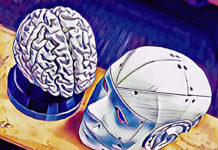Julia’s TEDx Talk: Time to Get Serious About Nutrition
Based on any data from any country it is clear that we have a problem. Mental illness is on the rise. Researchers in the emerging field of nutritional psychiatry have documented the benefits of micronutrients to treat mental illness, showing that micronutrients help treat depression, stress, anxiety and autism and ADHD. Not a single study shows that the Western diet is good for our mental health. Many questions remain to be answered, but we can make some recommendations.
New Study Investigates Cannabidiol (CBD) for Psychosis
A new study examines the effects of CBD as an adjunct therapy to antipsychotic medication for patients diagnosed with schizophrenia.
United Nations Rep Brings Attention to Human Rights Violations in Psychiatry
Dr. Dainius Pūras argues that the status quo in mental health treatment is no longer acceptable and demands political action to promote human rights.
BPS Releases Review of Alternatives to Antipsychotics
BPS releases report encouraging behavioral interventions for people with dementia, rather than antipsychotics
Mediterranean Diet Improves Mental Health, Study Finds
A diet rich in fruits, vegetables, whole grains, nuts, and fish has repeatedly been found to improve mental health.
Peer Support in Mental Health: Exploitive, Transformative, or Both?
The first time I tried to write about peer support—that emerging form of “service delivery” in which one person in recovery from what is described in the field as a “serious mental illness” offers support to another person who is in distress or struggling with a mental health condition—was in 1994. The manuscript was summarily rejected from an academic journal as representing what one of the reviewers described as “unsubstantiated rot.” That same article was eventually published 5 years later, and used by the President’s New Freedom Commission on Mental Health to support its recommendation that peer supports be implemented across the country. Now, more than a decade later and as peer support arrives at something of a crossroads, both of these reactions remain instructive.
How to Change Psychology to Address Racial Health Disparities
Psychology can only deal with racial health disparities effectively by incorporating critical race theory and intervening at a structural level.
Non-Medical Treatments for PTSD Effective, Study Suggests
Group-based MBSR and PCGT therapies effective as a complementary treatment for PTSD.
Researchers Make a Case for a “Theory of Nothing” in Psychology
What meaning do psychological constructs really hold, and how are they operationalized and statistically modeled within psychology research?
Large Rigorous Study Debunks Popular Gene-Environment Theory of Depression
A large and rigorous meta-analysis fails to find support for the gene-environment interaction theory of depression.
Rethinking Madness and Medication: Researcher Discusses Psychiatric Drug Withdrawal and Survivor Movements
New understandings of medication and withdrawal experiences warrant rethinking conceptualizations of health and “madness."
What is Contributory Injustice in Psychiatry?
An article on contributory injustice describes the clinical and ethical imperative that clinicians listen to service users experiences.
Linking Screen Time, Smartphones, and Stress Among Young Adults
New review ties increased screen time to increasing anxiety and depression among young adults throughout the United States.
Study Finds Hearing Voices Groups Improve Social and Emotional Wellbeing
Hearing Voices Network self-help groups are an important resource for coping with voice hearing, study finds.
Bright Light Therapy More Effective Than Medication Alone for Bipolar Depression
A new randomized, double-blind, placebo-controlled trial has found bright light therapy to be a powerful intervention that could provide an alternative to medication for people with “bipolar depression.”
Catching My Breath After A Panicked Journey
$24,000 later and no one knew what was wrong with me. They sent me home with a bag of pills. After being in the hospital, I developed a fear and mistrust of doctors. My general practitioner suggested antidepressants. More pills. It was all they could recommend. I wouldn’t take them. My anxiety worsened. I was obsessed with the idea that if I slept, I would die. So, I stayed awake as much as I could. For an entire year, this was how I lived.
JAMA Article Challenges CBT as Gold Standard for Psychotherapy
A review of CBT research findings raises questions about its status as the “evidence-based” psychotherapy of choice.
Pets Play Central Role in Management of Mental Health Problems
Individuals with long-term mental health conditions identify pets as valuable supports in their daily lives.
There is More to Mindfulness than the Brain
According to Lifshitz and Thompson, mindfulness is best understood as “complex orchestration of cognitive skills embodied in a particular social context.”
Existential Therapy Assists Patients Withdrawing From Psychiatric Drugs
Confronting existential anxiety through “Basal Exposure Therapy” shows promising results in people withdrawing from psychotropic drugs.
Madness and the Family, Part III: Practical Methods for Transforming Troubled Family Systems
We are profoundly social beings living not as isolated individuals but as integral members of interdependent social systems—our nuclear family system, and the broader social systems of extended family, peers, our community and the broader society. Therefore, psychosis and other forms of human distress often deemed “mental illness” are best seen not so much as something intrinsically “wrong” or “diseased” within the particular individual who is most exhibiting that distress, but rather as systemic problems that are merely being channeled through this individual.
The Conflicts That Result From Globalizing Euro-American Psychology in India
Researchers examine the transformation of work, life, and identity in India as a result of Western corporate and psychological culture.
Debate Ensues Over Rights-Based Approach to Mental Health
Debate ensues as scholars and policymakers discuss how to bring a rights-based approach to mental health policy.
Researchers Call for Structural Competency in Psychiatry
Structural competency in psychiatry emphasizes the social factors shaping patient presentations and encourages physician advocacy.
Reforming Schools to Prevent Mental Health Issues
New research explores the use of broad-based school-integrated resiliency and mindfulness interventions to prevent mental health concerns before they occur.































